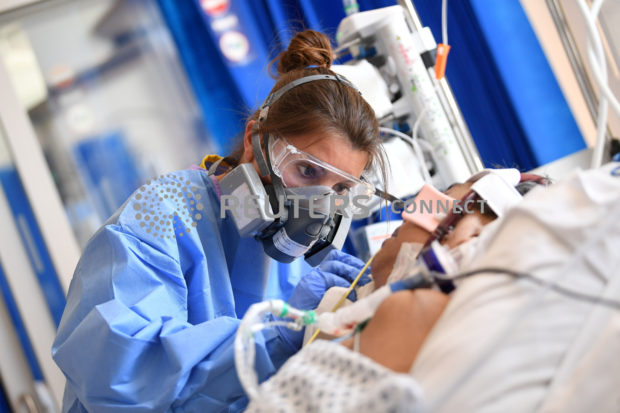
Clinical staff wear Personal Protective Equipment as they care for a patent at the Intensive Care unit at Royal Papworth Hospital, in Cambridge, Britain May 5, 2020. (Reuters)
LONDON — Nearly half of staff working in intensive care units (ICU) in England in the COVID-19 pandemic have severe anxiety, depression or post-traumatic stress disorder, with some reporting feeling they’d be better off dead, according to a study published on Wednesday.
Many ICU nurses and doctors meet the clinical threshold for PTSD, anxiety or problem drinking, and symptoms are so severe that some reported contemplating self-harm or suicide.
Such acutely poor mental health among ICU staff caring for critically ill and dying COVID-19 patients is likely to impair their ability to work effectively and harm their quality of life, the researchers leading the study said.
More than 81,000 people have died of COVID-19 in Britain, the world’s fifth-highest official death toll in the global pandemic.
More than 3 million people in Britain have tested positive for COVID-19 disease and the government says hospitals and intensive care wards are on the brink of being overwhelmed.
The pressure on ICU staff — who work with very sick patients for long periods in areas where the risk of COVID-19 exposure is high and where staff and equipment shortages pose problems on a daily basis — has been particularly high.
“The high rate of mortality amongst COVID-19 patients admitted to ICU, coupled with difficulty in communication and providing adequate end-of-life support to patients … are very likely to have been highly challenging stressors for all staff working in ICUs,” said Neil Greenberg, a professor at the Institute of Psychiatry, Psychology & Neuroscience at King’s College London who co-led the research.
The study, published in the journal Occupational Health, was conducted in June and July – before Britain began experiencing its latest surge in infections.
It found that among more than 700 healthcare workers in nine ICUs across England, 45% met the threshold for probable clinical significance for at least one of four serious mental health disorders: severe depression (6%), PTSD (40%), severe anxiety (11%) or problem drinking (7%).
Most worryingly, the researchers said, more than one in eight of those in the study reported frequent self-harming or suicidal thoughts – such as thinking of being better off dead, or of hurting themselves – in the previous two weeks.
The findings “highlight the potential profound impact that COVID-19 has had on the mental health of frontline UK staff,” Greenberg said, and show an urgent need for mental health services to be promptly accessible for all healthcare workers.